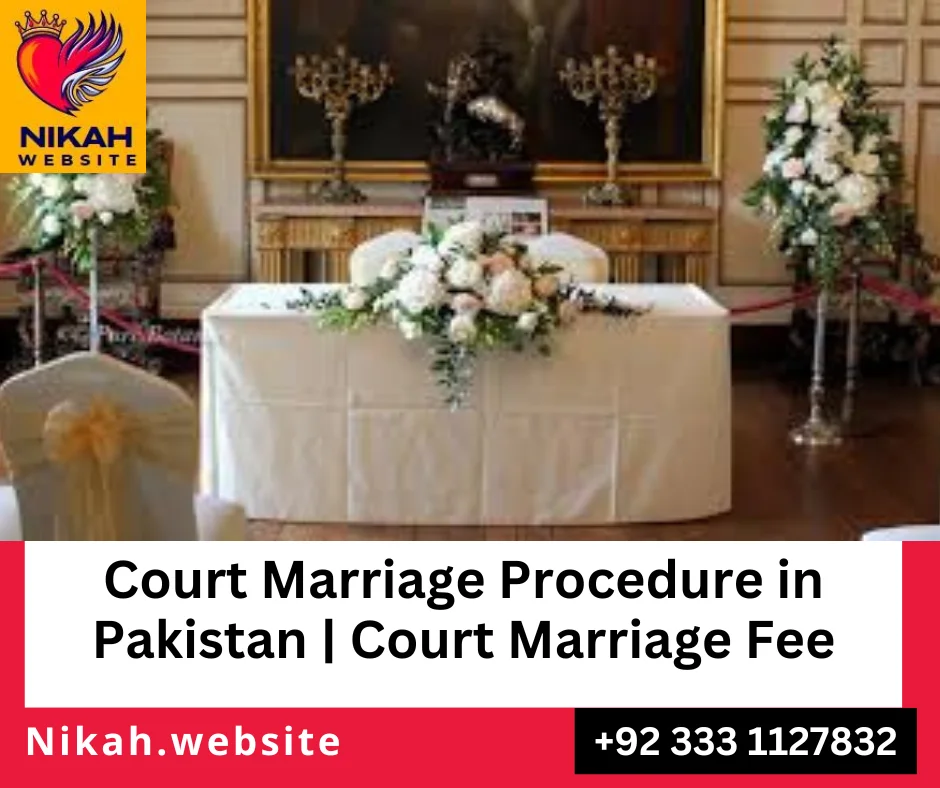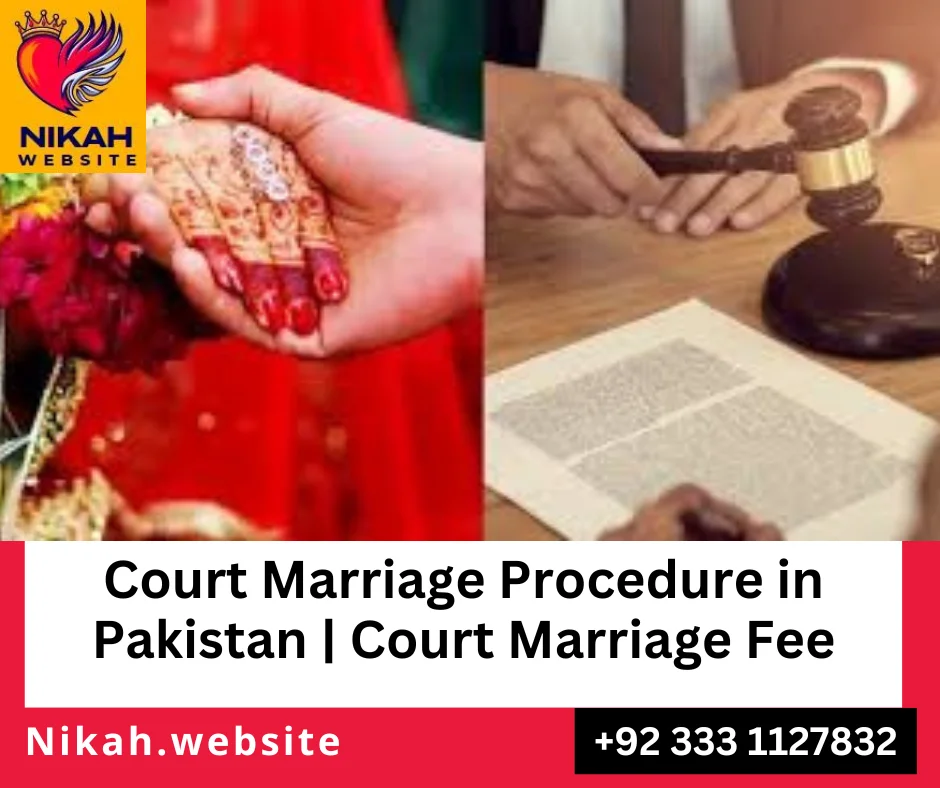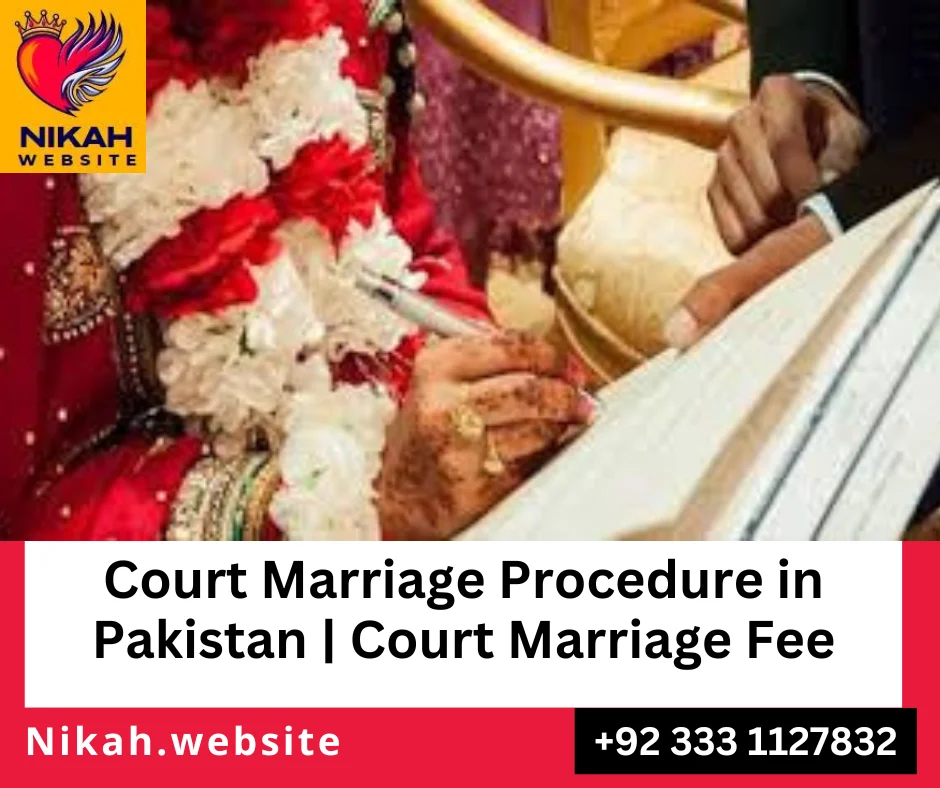Court Marriage: Simple and Efficient Path to Legal Union in Pakistan
Court marriage in Pakistan offers a straightforward, efficient, and legally binding way for couples to solemnize their union. Unlike traditional marriage ceremonies, which often involve elaborate rituals and extensive planning, the court marriage procedure focuses on simplicity and legality. As a result, it has become an attractive option for many couples wishing to avoid the complexities and expenses that customary weddings often entail.
Court Marriage Procedure in Pakistan: Minimal Formalities and Maximum Inclusivity
The court marriage procedure in Pakistan is appealing due to its minimal requirement for religious or cultural formalities, enabling individuals from diverse backgrounds to marry without restriction. This method ensures that the marriage complies with the laws of Pakistan, providing both legal protection and recognition.
The Streamlined Procedure of Court Marriage in Lahore, Islamabad, Karachi, and Rawalpindi
Moreover, the convenience factor is significant. Many may assume that court marriage involves tedious courtroom visits and a complicated legal process. However, the reality is quite the opposite. Dedicated court marriage lawyer’s offices in major cities like Lahore, Islamabad, Karachi, and Rawalpindi facilitate the procedure efficiently. Our offices are designed to handle marriage registrations, making the process streamlined and straightforward.
Streamlining The Procedure: How Court Marriage Offices Reduce Waiting Times
For couples seeking a hassle-free marriage process, our court marriage offices in Karachi, Lahore, Islamabad, and Montreal offer unparalleled convenience. These offices serve as centralized hubs, minimizing the need for multiple visits to various departments and cutting down on extended waiting periods. The focus on simplicity and ease in our court marriage services highlights why so many choose this path. Whether you’re looking to avoid traditional wedding arrangements or ensure a smooth legal process without unnecessary complications, court marriage in Pakistan remains a practical and accessible option.
Court Marriage Procedure is Governed By Diverse Legal Frameworks
In Pakistan, the court marriage procedure is governed by diverse legal frameworks encompassing both civil and Islamic laws. Importantly, it is a prevailing misconception that one needs explicit court approval to solemnize a marriage. In reality, the legal process does not necessitate court approval if the marriage is executed under the stipulated legal provisions.
Court Marriage Fee/Cost in Karachi, Lahore, Islamabad & Rawalpindi, Pakistan
The court marriage fee in Pakistan’s major cities, Karachi, Lahore, Islamabad, and Rawalpindi is designed to be affordable and transparent, making it accessible for couples across the country. This fee covers all the essential legal formalities involved in the court marriage process, ensuring a smooth and efficient experience. By opting for court marriage in Pakistan, couples can enjoy a legally recognized union without facing exorbitant costs, making it a practical choice for those seeking a straightforward and cost-effective way to formalize their relationship.


Efficient Court Marriage Services in Major Pakistani Cities
Our court marriage offices in Karachi, Lahore, Islamabad, and Montreal are pivotal in facilitating and solemnizing marriages. These offices ensure that every court marriage meets all legal requirements, serving as essential intermediaries. By offering comprehensive court marriage services, including the arrangement of all necessary documentation, we simplify the entire process for couples, making court marriage a seamless and stress-free experience.
Court Marriage Essentials: The Lawyer, Nikah Khawan, and Witness Requirements
The marriage must take place in the presence of essential stakeholders, which include a qualified lawyer, a nikah khawan, and witnesses. Our lawyer ensures that all legal documentation and formalities are meticulously observed, providing legal guidance and support throughout the process. The nikah khawan or imam, who performs the religious aspect of the wedding, ensures that the marriage contract is legitimately executed in compliance with Islamic law. Typically, two adult male witnesses or one male and two female witnesses are required to attest to the nikah, thus further solidifying the legal standing of the marriage.
The Importance of Stakeholder Collaboration in Validating Court Marriage
Each stakeholder works in tandem to affirm the marriage’s legality, ensuring that both parties willingly enter into the union without any duress or coercion. Therefore, while court approval in a literal sense is not required, the lawful presence and acknowledgment from these key individuals and adherence to legal protocols hold paramount importance.
Two Muslim Male Witnesses Validate a Court Marriage in Pakistan
The court marriage procedure in Pakistan mandates the involvement of several key participants, each playing a crucial role in ensuring that the marriage contract aligns with both legal and religious stipulations. To begin with, two male witnesses who are Muslim and sane are indispensable for the legitimacy of the marriage. These witnesses are responsible for attesting to the mutual consent of the bride and groom, thus serving as a critical safeguard in upholding the integrity of the marital commitment.
From Affidavits to NOCs: The Lawyer’s Responsibilities in Court Marriage
In addition to the witnesses, our matrimonial lawyer is often engaged in facilitating the court marriage procedure in Pakistan. The lawyer’s primary responsibility is to ensure that all legal documentation is meticulously prepared and duly filed. This includes the drafting and submission of the marriage affidavit, the completion of the marriage registration forms, and obtaining the Non-Objection Certificate (NOC) if required. Our lawyer’s expertise helps navigate the legal complexities, ensuring that the marriage is recognized under the law.
Religious Oversight: The Nikah Khawan’s Role in Court Marriage Procedures
Another essential participant is the nikah khawan, commonly referred to as an imam. The nikah khawan performs the actual marriage ceremony, known as the nikah. This religious figure is tasked with reciting the traditional Islamic vows and overseeing the signing of the nikahnama (marriage contract). The nikah khawan ensures that the marriage aligns with Islamic principles, making the union religiously binding.
Creating a Valid Framework: The Combined Efforts of Court Marriage Participants
Collectively, these participants perform roles that are interwoven to guarantee that the court marriage in Pakistan is both legally valid and religiously accepted. The witnesses confirm the mutual consent, the lawyer addresses the legal formalities, and the nikah khawan officiates the ceremonial aspect. Their combined efforts create a framework that respects both civil law and religious doctrine, thereby embodying the dual facets essential for court marriage in Pakistan.
The First Step in Court Marriage: What to Expect at the Marriage Office
When planning a court marriage in Pakistan, visiting the court marriage office is pivotal. Understanding this process can alleviate much of the stress associated with legal formalities. Upon arrival at the office, couples must provide specific documentation to initiate the proceedings. Important documents typically include valid national identity cards, passport-sized photographs, and, if applicable, proof of divorce or death certificates of a former spouse. Ensuring that these documents are complete and authentic is essential for the smooth progress of the court marriage procedure.


The Crucial Role of Our Court Marriage Offices in Pakistan
The procedures at our court marriage offices are designed to be straightforward and hassle-free. When a couple visits the office, they are not required to fill out an application form. Instead, we handle all the necessary paperwork. Clients also do not need to arrange for witnesses, as we provide Muslim witnesses for the Nikah ceremony. Our court marriage offices in Karachi, Islamabad, Rawalpindi, and Lahore adhere to these streamlined protocols, ensuring a smooth and efficient process for all couples.
What to Expect at the Court Marriage Office: Ambiance and Practical Tips
The environment of court marriage offices, while formal, is generally conducive to the process it facilitates. Our offices maintain a business-like ambiance, focusing on efficiency and accuracy. Couples will observe that the staff is usually welcoming and helpful, guiding them through each step of the procedure. However, due to the volume of couples, there can be waiting times, so patience is necessary. It is also advisable to visit our court marriage office early in the day to avoid delays.
City Guide: Effective Strategies for Court Marriage in Karachi, Islamabad, Rawalpindi, and Lahore
For those navigating court marriages in major cities like Karachi, Islamabad, Rawalpindi, and Lahore, specific practical advice can prove beneficial. In Karachi, the bustling nature of the city suggests an early start to avoid traffic congestion. In Islamabad, owing to the organized layout, couples might find the process smoother, yet it is wise to adhere strictly to appointment schedules. Rawalpindi’s court marriage offices typically experience heavy footfall, necessitating timely arrival. Lahore, known for its historical backdrop, offers a well-supported infrastructure for court marriages, though the procedural formalities remain equally strict.
Court Marriage in Pakistan: Affidavit of Free Will Must Be Signed By The Bride
The procedure for court marriage in Pakistan begins with a significant and legally critical step: signing the Affidavit of Free Will. This document is particularly essential as it ensures that the bride is entering the marriage of her own volition, free from any external pressures or coercion. The Affidavit of Free Will must be signed by the bride before any official legal proceedings can commence. This serves as a declaration that she consents to the marriage without pressure from family, friends, or any other sources.
Affidavit in Court Marriage: Confirming Consent and Legal Standing
Typically, the bride has to sign an affidavit. The notary or official will confirm her identity and willingness to marry. This document not only affirms her free will but also guarantees her legal standing; in case of any disputes or complications that may arise in the future, the affidavit acts as a substantial piece of evidence affirming her initial consent.
Legal Protection Through the Affidavit of Free Will in Pakistani Court Marriages
The importance of this step in the court marriage procedure cannot be overstated. Legal systems worldwide recognize the autonomy and consent of individuals entering into marriage. In Pakistan, incorporating the Affidavit of Free Will adds a robust layer of protection for the bride. It ensures that both parties have mutually agreed to the union, thereby upholding the principles of mutual respect and consent that form the foundation of a lawful and fair marriage.


Affidavit of Free Will: A Cornerstone for Valid Court Marriage Procedures
This step also holds considerable legal weight; a properly executed affidavit can assist in settling disputes and legal complications, should they arise. Therefore, this document must be meticulously prepared and authenticated, making it a cornerstone in the procedure of court marriages in Pakistan. The formal signing of the Affidavit of Free Will underscores the legitimacy and willingness behind the marital agreement, setting the stage for the subsequent steps in the court marriage process.
Court Marriage: Performing Ijab-o-Qabool and Khutba-e-Nikah
In the court marriage procedure in Pakistan, the second crucial step is conducting the Ijab-o-Qabool and the Khutba-e-Nikah. These rituals, steeped in tradition, symbolize the solemnization of the marriage through an official offer and acceptance (Ijab-o-Qabool) and the religious lecture or sermon (Khutba-e-Nikah).
Steps in Court Marriage: Conducting Ijab-o-Qabool and Khutba-e-Nikah
Ijab-o-Qabool is the cornerstone of any Islamic marriage, where the bride and groom mutually agree to marry one another. This public declaration begins with the groom offering to marry the bride, followed by her acceptance. It is performed in the presence of at least two witnesses to ensure that the consent is given freely and willingly, thus validating the marriage in the eyes of both Islam and the judiciary. The presence of a guardian (wali) for the bride is also traditionally significant, though not always legally required, depending on the specific circumstances and personal preferences of the individuals involved.
How Khutba-e-Nikah Highlights the Responsibilities of Marriage?
The Khutba-e-Nikah, or the marriage sermon, usually follows the Ijab-o-Qabool. It is a religious recitation led by an Imam or a religious scholar. During this ritual, verses from the Quran, alongside Hadiths (sayings of the Prophet Muhammad), are read aloud. The Khutba aims to remind the couple of their duties and responsibilities towards each other and their community, underscoring the sanctity and seriousness of marriage. It reinforces the ethical and spiritual dimensions of the union, advocating for compassion, fidelity, and mutual respect.
The Marriage Sermon: Khutba-e-Nikah and Its Role in Court Marriage
Conducting the Ijab-o-Qabool and the Khutba-e-Nikah within a legal setting, such as a court marriage in Pakistan, ensures that the marriage is both religiously and legally binding. This integration of religious and judicial protocols serves to authenticate the marriage, offering the couple a recognized and safeguarded marital status. Therefore, appreciating the historical and spiritual depth of these rituals provides a profound understanding of their importance in the court marriage procedure.
Step for Court Marriage Signing the Nikah Nama
The process of court marriage in Pakistan involves multiple formalities to ensure the marriage is legally recognized. One of the most vital steps in this process is signing the Nikah Nama, the formal marriage contract. This document, prepared in quadruplicate, requires signatures from the bride, and groom, and two witnesses from each side, validating the agreement of all parties involved.
The Nikah Khawan’s Signature: A Key Element in Court Marriage Legitimacy
The Nikah Khawan (marriage officiant) plays a significant role by presiding over this signing ceremony. The Nikah Khawan attests to the authenticity of the proceeding by placing his signature on each copy of the Nikah Nama. This process affirms that the marriage meets the religious and legal stipulations of a court marriage in Pakistan.

The Official Seal: A Key Element in the Legal Recognition of Court Marriages
An important aspect of this step is the affixing of the official seal or stamp. The Nikah Registrar’s official seal is placed on the Nikah Nama, certifying the legitimacy of the document. The seal acts as a formal acknowledgment that the marriage contract is recognized under Pakistani law, making the union legally binding.
Court Marriage: Seal Certifies the Marriage Contract Under Pakistani Law
After all necessary signatures and stamps are affixed, this step culminates in the registration of the marriage into the local marriage register at the Union Council. The inclusion of the marriage details in this official registry is crucial, as it provides legal evidence of the marital status of the parties involved. This record can be essential for various legal and administrative purposes in the future.
Court Marriage Procedure Effectively Official Seal in Validating the Nikah Nama
Completing this step with careful attention to detail helps avoid potential legal complications. Ensuring all signatures, witness attestations, and official seals are accurately placed on the Nikah Nama provides a solid foundation upon which the couple’s legal marital status is established, hence finalizing the court marriage procedure effectively.
Court Marriage in Post-marriage Documentation and Certification
Upon the successful completion of the court marriage in Pakistan, the nikah nama, also known as the marriage contract, is duly signed by both parties in the presence of witnesses and the marriage registrar. This act finalizes the court marriage procedure, conferring official recognition to the union. Each party receives a copy of the nikah nama immediately after signing, ensuring that both spouses possess tangible, legal proof of their marriage.
Court Marriage Process of Registering Your Nikah Nama with the Local Union Council
Following this, it is crucial to submit the signed nikah nama to the local Union Council for registration. This step is vital, as it ensures the marriage is officially recorded within the governmental legal framework, facilitating future legal and administrative processes. The Union Council will issue a formal marriage registration certificate, affirming that the marriage is recognized by the state.
Marriage Registration Certificate (MRC): A computerized NADRA Marriage Certificate) is Useful for Legal and International Matters.
For those who require an advanced form of certification, obtaining an MRC (computerized Marriage Registration Certificate) is a viable option. This certificate provides a digitized and more accessible record of the marriage, which can be particularly useful for legal proceedings or international matters. This computerized document can be requested through the Union Council and often involves filling out an application accompanied by a nominal fee.
Why Ministry of Foreign Affairs (MOFA) Attestation is Crucial for International Marriage Validation
In scenarios where international acknowledgment of the marriage is necessary, such as when applying for visas or immigration, the attestation of marriage documents by the Ministry of Foreign Affairs (MOFA) is indispensable. The procedure entails submitting the original marriage certificate along with a request for attestation to the Ministry. Upon verification of the documents, (MOFA) will authenticate the marriage certificate, thereby facilitating its recognition by foreign authorities.
Court Marriage Process of Registering Your Nikah Nama with the Local Union Council
Following this, it is crucial to submit the signed nikah nama to the local Union Council for registration. This step is vital, as it ensures the marriage is officially recorded within the governmental legal framework, facilitating future legal and administrative processes. The Union Council will issue a formal marriage registration certificate, affirming that the marriage is recognized by the state.
Marriage Registration Certificate (MRC): A computerized NADRA Marriage Certificate) is Useful for Legal and International Matters.
For those who require an advanced form of certification, obtaining an MRC (computerized Marriage Registration Certificate) is a viable option. This certificate provides a digitized and more accessible record of the marriage, which can be particularly useful for legal proceedings or international matters. This computerized document can be requested through the Union Council and often involves filling out an application accompanied by a nominal fee.
Court Marriage Process of Registering Your Nikah Nama with the Local Union Council
Following this, it is crucial to submit the signed nikah nama to the local Union Council for registration. This step is vital, as it ensures the marriage is officially recorded within the governmental legal framework, facilitating future legal and administrative processes. The Union Council will issue a formal marriage registration certificate, affirming that the marriage is recognized by the state.
Marriage Registration Certificate (MRC): A computerized NADRA Marriage Certificate) is Useful for Legal and International Matters.
For those who require an advanced form of certification, obtaining an MRC (computerized Marriage Registration Certificate) is a viable option. This certificate provides a digitized and more accessible record of the marriage, which can be particularly useful for legal proceedings or international matters. This computerized document can be requested through the Union Council and often involves filling out an application accompanied by a nominal fee.

